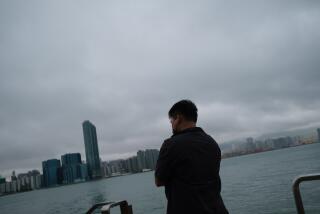Locals Must Steer Straight
The world’s eyes are turned to Hong Kong as the British surrender their last colonial outpost.
In the West, much of the press has dwelt on speculation about China’s faithfulness to its promises and repression of human rights and democracy. Concerns about China’s efforts to control Hong Kong are legitimate.
But Hong Kong’s future autonomy and prosperity will depend as much on developments within Hong Kong as it will on the dispositions of China’s leaders. Four internal developments bear watching.
% The integrity of Hong Kong’s administrative system. The fortunes of democratic institutions have been at the center of the soap opera triggered by the Sino-British Joint Declaration of 1984. A provisional legislature appointed by China, not authorized in Hong Kong’s mini-constitution, is to govern until new elections, probably next spring. The gamesmanship between outgoing Gov. Chris Patten and the Chinese over the democracy issue has drawn attention away from the fact that it has been Hong Kong’s benevolent yet autocratic administrative institutions that have guided its ascent as an economic power.
Beijing-appointed Chief Executive Tung Chee-hwa’s assignment of policy portfolios to his Executive Committee (ExCo), a small group of advisors composed almost exclusively of business interests, has the potential for undermining Hong Kong’s administrative system. Tung’s decision serves to fragment the system, introduces serious conflicts of interest between the public and private roles of ExCo members and opens admin- istrative decisions to external influences, including the Chinese Communist Party.
% Growing socioeconomic cleavages. Hong Kong’s economy has grown an average of 7% per year in real terms during the last two decades, twice as fast as the world economy. The expansion has not come without a price. More than three-quarters of Hong Kong’s gross domestic product emanates from the service sector, heavily dependent on China’s economy and vulnerable in the long term to competition from within China and abroad. Income gains have been distributed unevenly, widening the gap between the very wealthy and the rest of the citizenry. Speculation has priced many out of local property markets and placed further pressure on the lower and middle classes. Hong Kong risks going down the same path as other developed countries in which the middle class is alienated and rebellious.
The cleavages are not solely economic, but political and social as well. Hong Kong is a diverse society in which tolerance has been the norm, but in the current climate the differences will prove more difficult to reconcile. The trust that has been stockpiled by the consultative style of British rule is at risk as locals seek to ingratiate themselves to their new masters and Communist Party members in Hong Kong seek influence.
% Irrational exuberance. In the run-up to the hand-over, Hong Kong investors have become enamored with “red chips” and H- shares, local investments with connections to mainland companies. They account for about 10% of the capitalization of the Hong Kong market. Many are small, badly managed and skirt financial disclosure requirements. They often don’t play by any rules of traditional financial markets.
But more troublesome is the prospect that the Hong Kong market will become highly volatile and perceived as a bad risk. If overseas investors turn away from Hong Kong, the overall health of its economy could be threatened.
% Self-censorship. The limits on post-1997 Hong Kong’s autonomy and citizens’ rights are untested. A sure way to narrow these rights is not to exercise them. Self-censorship is a growing problem. Symptomatic are two recent incidents. A local newspaper tested the willingness of pager companies to transmit sensitive messages. Seven companies conveyed “Chris Patten, scram” but two refused to transmit “Down with the Communist Party,” without legal basis for doing so.
A second incident involved the Pillar of Shame, a statue created to commemorate the Tiananmen Square massacre. Elected members of the urban and regional councils refused to exhibit it because of its political message.
The obstacles that confront Hong Kong citizens are surmountable. Hong Kong will continue to enjoy the freedoms promised to it by the 1984 Joint Declaration if its people and diverse leadership continue to exercise their rights. This is likely to call for courage from Hong Kong citizens, individually and collectively. Anything less assures that the erosion of rights in this miracle of Asia will become a self-fulfilling prophecy.
More to Read
Sign up for Essential California
The most important California stories and recommendations in your inbox every morning.
You may occasionally receive promotional content from the Los Angeles Times.










